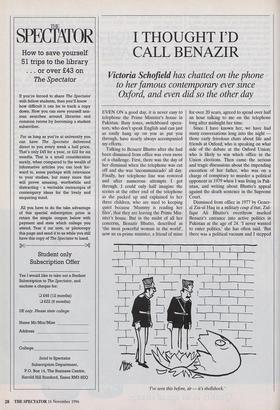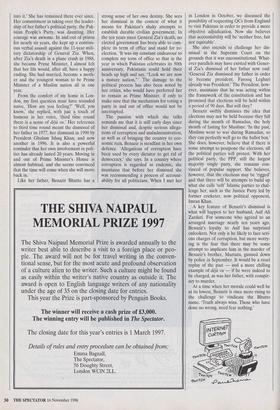I THOUGHT I'D CALL BENAZIR
Victoria Schofield has chatted on the phone
to her famous contemporary ever since Oxford, and even did so the other day
EVEN ON a good day, it is never easy to telephone the Prime Minister's house in Pakistan. Busy tones, switchboard opera- tors, who don't speak English and can just as easily hang up on you as put you through, have nearly always accompanied my efforts.
Talking to Benazir Bhutto after she had been dismissed from office was even more of a challenge. First, there was the day of her dismissal when the telephone was cut off and she was 'incommunicado' all day. Finally, her telephone line was restored and after numerous attempts I got through. I could only half imagine the scenes at the other end of the telephone as she packed up and explained to her three children, who are used to keeping quiet because 'Mummy is reading her files', that they are leaving the Prime Min- ister's house. But in the midst of all her concerns, Benazir Bhutto, described as `the most powerful woman in the world', now an ex-prime minister, a friend of mine for over 20 years, agreed to spend over half an hour talking to me on the telephone long after midnight her time.
Since I have known her, we have had many conversations long into the night those early frivolous chats about life and friends at Oxford; who is speaking on what side of the debate at the Oxford Union; who is likely to win which office in the Union elections. Then came the serious and tragic discussions about the impending execution of her father, who was on a charge of conspiracy to murder a political opponent in 1979 when I was living in Pak- istan, and writing about Bhutto's appeal against the death sentence in the Supreme Court.
Dismissed from office in 1977 by Gener- al Zia-ul Haq in a military coup d'etat, Zul- fiqar Ali Bhutto's overthrow marked Benazir's entrance into active politics in Pakistan at the age of 24. 'I never wanted to enter politics,' she has often said. 'But there was a political vacuum and I stepped I've seen this before, sir — its shellshock.' into it.' She has remained there ever since. Her commitment in taking over the leader- ship of her father's political party, the Pak- istan People's Party, was daunting. Her courage was awsome. In and out of prison for nearly six years, she kept up a continu- ous verbal assault against the 11-year mili- tary dictatorship of General Zia. When, after Zia's death in a plane crash in 1988, she became Prime Minister, I almost felt that her life would, after all, have a happy ending. She had married, become a moth- er and the youngest woman to be Prime Minister of a Muslim nation all in one year.
From the comfort of my home in Lon- don, my first question must have sounded naive, 'How are you feeling?"Well, you know,' she replied, with just a touch of humour in her voice, 'third time round there is a sense of déjà vu.' Her reference to third time round meant the dismissal of her father in 1977, her dismissal in 1990 by President Ghulam Ishaq Khan, and now another in 1996. It is also a powerful reminder that her own involvement in poli- tics has already lasted 20 years. Moving in and out of Prime Minister's House is almost habitual, and she seems convinced that the time will come when she will move back in.
Like her father, Benazir Bhutto has a strong sense of her own destiny. She sees her dismissal in the context of what it means for Pakistan's shaky attempts to establish durable civilian government. In the ten years since General Zia's death, no elected government has been able to com- plete its term of office and stand for re- election. 'It was my constant endeavour to complete my term of office so that in the year in which Pakistan celebrates its 50th anniversary, Pakistanis could hold their heads up high and say, "Look we are now a mature nation."' The damage to the political process has also been noted by her critics, who would have preferred her to remain as Prime Minister, if only to make sure that the mechanism for voting a party in and out of office would not be interrupted.
The passion with which she talks reminds me that it is still early days since her dismissal and, despite serious allega- tions of corruption and maladministration, as well as of bringing the country to eco- nomic ruin, Benazir is steadfast in her own defence. 'Allegations of corruption have been used by every dictator to get rid of democracy,' she says. In a country where corruption is regarded as endemic, she maintains that before her dismissal she was recommending a process of account- ability for all politicians. When I met her in London in October, we discussed the possibility of requesting QCs from England to visit Pakistan in order to provide a more objective adjudication. Now she believes that accountability will be 'neither free, fair nor equitable'.
She also intends to challenge her dis- missal in the Supreme Court on the grounds that it was unconstitutional. What- ever parallels may have existed with Gener- al Zia's dismissal of her father now end: `General Zia dismissed my father in order to become president. Farooq Leghari already was President.' The President, how- ever, maintains that he was acting within the framework of the constitution and has promised that elections will be held within a period of 90 days. But will they?
Benazir swiftly dismisses the idea that elections may not be held because they fall during the month of Ramadan, the holy month of fasting for Muslims: 'In the past, Muslims went to war during Ramadan, so they can perfectly well go to the ballot box.' She does, however, believe that if there is some attempt to postpone the elections, all the political parties will protest. With her political party, the PPP, still the largest majority single party, she remains con- vinced of popular support. She believes, however, that the elections may be 'rigged' and that there will be attempts to build up what she calls 'soft' Islamic parties to chal- lenge her, such as the Justice Party led by former cricketer, now political opponent, Imran Khan.
A key feature of Benazir's dismissal is what will happen to her husband, Asif Ali Zardari. For someone who agreed to an arranged marriage nearly ten years ago, Benazir's loyalty to Asif has surprised onlookers. Not only is he likely to face seri- ous charges of corruption, but more worry- ing is the fear that there may be some attempt to implicate him in the murder of Benazir's brother, Murtaza, gunned down by police in September. It would be a cruel replay of the past — and a more chilling example of déjà vu — if he were indeed to be charged, as was her father, with conspir- acy to murder.
At a time when her morale could well be at its lowest, Benazir is once more rising to the challenge to vindicate the Bhutto name. 'Truth always wins. Those who have done no wrong, need fear nothing.'



















































































 Previous page
Previous page